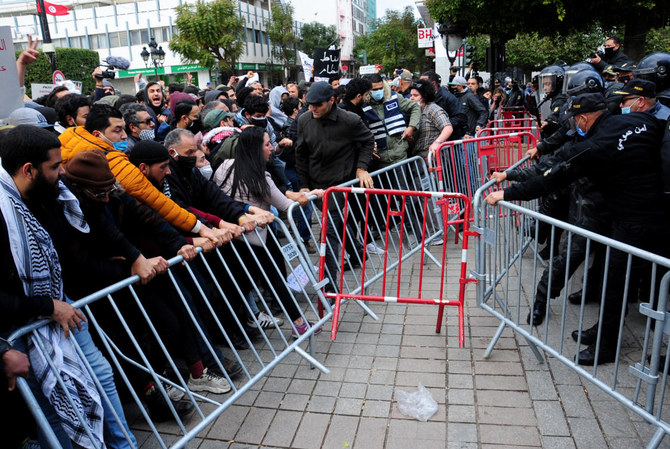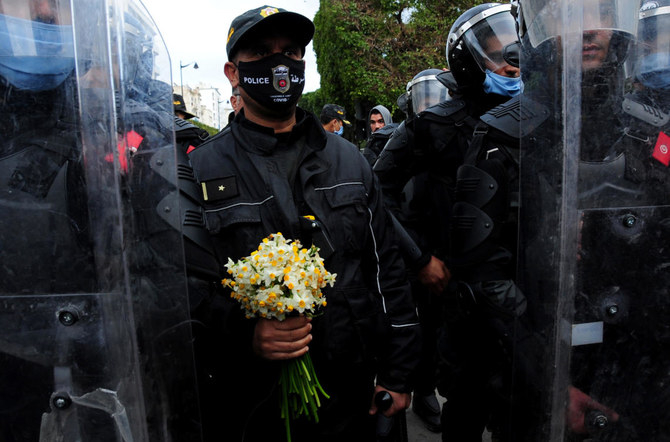TUNIS: Hundreds of demonstrators took to the streets of Tunisian cities on Saturday to protest police repression, corruption and poverty, following several nights of unrest marked by clashes and arrests.
Saturday’s protests come as the North African nation struggles to stem the novel coronavirus pandemic, which has crippled the economy and threatened to overwhelm hospitals.
Over 6,000 people have died from Covid-19 in Tunisia, with a record 103 deaths reported on Thursday.
The government on Saturday extended a night-time curfew from 8 p.m. (1900 GMT) to 5 a.m. and banned gatherings until February 14.
But protesters took to the streets in several parts of the country, including the capital Tunis and the marginalized interior region of Gafsa, to demand the release of hundreds of young people detained during several nights of unrest since January 14.
“Neither police nor Islamists, the people want revolution,” chanted demonstrators in a crowd of several hundred in Tunis, where one person was wounded in brief clashes amid a heavy police presence.
Protests were also held in the coastal city of Sfax on Friday.
Much of the unrest has been in working class neighborhoods, where anger is boiling over soaring unemployment and a political class accused of having failed to deliver good governance, a decade after the 2011 revolution that toppled long-time dictator Zine El Abidine Ben Ali.
Economic misery exacerbated by novel coronavirus restrictions in the tourism-reliant nation have pushed growing numbers of Tunisians to try to leave the country.
“The situation is catastrophic,” said Omar Jawadi, 33, a hotel sales manager, who has been paid only half his salary for months.
“The politicians are corrupt, we want to change the government and the system.”
The police have said more than 700 people were arrested over several nights of unrest earlier this week that saw young people hurl rocks and petrol bombs at security forces, who responded with tear gas and water cannon.
Human rights groups on Thursday said at least 1,000 people had been detained.
“Youth live from day to day, we no longer have hope, neither to work nor to study — and they call us troublemakers!” said call center worker Amine, who has a degree in aerospace engineering.
“We must listen to young people, not send police in by the thousands. The whole system is corrupt, a few families and their supporters control Tunisia’s wealth.”
Tunisia last week marked one decade since Ben Ali fled the country amid mass protests, ending 23 years in power.
Tunisia’s political leadership is divided, with Prime Minister Hichem Mechichi waiting for parliament to confirm a major cabinet reshuffle announced last Saturday.
Hundreds protest police repression in Tunisia
https://arab.news/9ht47
Hundreds protest police repression in Tunisia

- Saturday’s protests come as the North African nation struggles to stem the novel coronavirus pandemic
- The government on Saturday extended a night-time curfew from 8 p.m. (1900 GMT) to 5 a.m. and banned gatherings until February 14
24 killed as pro-Ankara factions clash with Syria’s Kurdish-led SDF

- The latest bout of fighting was sparked by attacks by the Turkiye-backed fighters on two towns south of Manbij, the Syrian Observatory for Human Rights said
- Swathes of northern Syria are controlled by the US-backed SDF, which spearheaded the fight that helped oust the Daesh group from its last territory in Syria in 2019
BEIRUT: At least 24 fighters, mostly from Turkish-backed groups, were killed in clashes with the Kurdish-led Syrian Democratic Forces (SDF) in the northern Manbij district, a war monitor said on Thursday.
The violence killed 23 Turkish-backed fighters and one member of the SDF-affiliated Manbij Military Council, the Syrian Observatory for Human Rights said.
The Britain-based war monitor said the latest bout of fighting was sparked by attacks by the Ankara-backed fighters on two towns south of Manbij.
Swathes of northern Syria are controlled by a Kurdish-led administration whose de facto army, the US-backed SDF, spearheaded the fight that helped oust the Daesh group from its last territory in Syria in 2019.
Turkiye accuses the main component of the SDF, the People’s Protection Units (YPG), of being affiliated with the militant Kurdistan Workers’ Party (PKK), which both Washington and Ankara blacklist as a terrorist group.
Fighting has raged around the Arab-majority city of Manbij, controlled by the Manbij Military Council, a group of local fighters operating under the SDF.
According to the Observatory, “clashes continued south and east of Manbij, while Turkish forces bombarded the area with drones and heavy artillery.”
The SDF said it repelled attacks by Turkiye-backed groups south and east of Manbij.
“This morning, with the support of five Turkish drones, tanks and modern armored vehicles, the mercenary groups launched violent attacks” on several villages in the Manbij area, the SDF said in a statement.
“Our fighters succeeded in repelling all the attacks, killing dozens of mercenaries and destroying six armored vehicles, including a tank.”
Turkiye has mounted multiple operations against the SDF since 2016, and Ankara-backed groups have captured several Kurdish-held towns in northern Syria in recent weeks.
The fighting has continued since rebels led by Islamist group Hayat Tahrir Al-Sham (HTS) toppled longtime ruler Bashar Assad on December 8.
King Charles donates to International Rescue Committee’s Syria aid operation

- Donation will fund healthcare, protect children, provide emergency cash
LONDON: King Charles III has helped pay for urgent humanitarian aid needed in Syria after the fall of Bashar Assad.
Charles made an undisclosed donation to International Rescue Committee UK to fund healthcare, protect children and provide emergency cash.
The king is the patron of the charity, which says Syria is facing profound humanitarian needs despite the defeat of the Assad regime by opposition forces.
Khusbu Patel, IRC UK’s acting executive director, said: “His Majesty’s contribution underscores his deep commitment to addressing urgent global challenges, and helping people affected by humanitarian crises to survive, recover and rebuild their lives.
“We are immensely grateful to His Majesty The King for his donation supporting our work in Syria. This assistance will enable us to provide essential services, including healthcare, child protection and emergency cash, to those people most in need.”
The charity said it was scaling-up its efforts in northern Syria to evaluate the urgent needs of communities. Towns and villages have become accessible to aid groups for the first time in years now that rebel forces have taken control of much of the country.
The charity said Syria ranks fourth on its emergency watchlist for 2025 and a recent assessment found that people in the northeast of the country were facing unsafe childbirth conditions, cold-related illnesses, water contamination, and shortages of medical supplies.
Charles last month said he would be “praying for Syria” as he attended a church service in London attended by various faiths.
The king met Syrian nun Sister Annie Demerjian at the event, who described the situation in her homeland after the regime had been swept from power.
Israel strikes Syrian army positions near Aleppo: monitor

- Syrian Observatory for Human Rights said the strikes targeted defense and research facilities
BEIRUT: Israel bombed Syrian army positions south of Aleppo on Thursday, the latest such strikes since the overthrow of longtime strongman Bashar Assad, a war monitor and local residents said.
Residents reported hearing huge explosions in the area, while the Syrian Observatory for Human Rights said the strikes targeted defense and research facilities.
The observatory said that “at least seven massive explosions were heard, resulting from an Israeli airstrike on defense factories... south of Aleppo.”
There was no immediate information on whether the strikes caused any casualties.
Syrian state TV also reported about an Israeli strike in Aleppo without providing details.
A resident of the Al-Safira area told AFP on condition of anonymity: “They hit defense factories, five strikes... The strikes were very strong. It made the ground shake, doors and windows opened — the strongest strikes I ever heard... It turned the night into day.”
Since opposition forces overthrew Assad in early December, Israel has conducted hundreds of strikes on Syrian military assets, saying they are aimed at preventing military weapons from falling into hostile hands.
After Ocalan visit, Turkiye opposition MPs brief speaker, far-right leader

ISTANBUL: A delegation from Turkiye’s pro-Kurdish opposition DEM party met Thursday with the parliamentary speaker and far-right MHP leader amid tentative efforts to resume dialogue between Ankara and the banned PKK militant group. DEM’s three-person delegation met with Speaker Numan Kurtulmus and then with MHP leader Devlet Bahceli.
The aim was to brief them on a rare weekend meeting with Abdullah Ocalan, the jailed founder of the Kurdistan Workers’ Party who is serving life without parole on Imrali prison island near Istanbul.
It was the Ocalan’s first political visit in almost a decade and follows an easing of tension between Ankara and the PKK, which has waged a decades-long insurgency on Turkish soil and is proscribed by Washington and Brussels as a terror group.
The visit took place two months after Bahceli extended a surprise olive branch to Ocalan, inviting him to parliament to disband the PKK and saying he should be given the “right to hope” in remarks understood to moot a possible early release.
Backed by President Recep Tayyip Erdogan, the tentative opening came a month before Syrian rebels began a lightning 12-day offensive that ousted Bashar Assad in a move which has forced Turkiye’s concerns about the Kurdish issue into the headlines.
During Saturday’s meeting with DEM lawmakers Sirri Sureyya Onder and Pervin Buldan, Ocalan said he had “the competence and determination to make a positive contribution to the new paradigm started by Mr.Bahceli and Mr.Erdogan.”
Onder and Buldan then “began a round of meetings with the parliamentary parties” and were joined on Thursday by Ahmet Turk, 82, a veteran Kurdish politician with a long history of involvement in efforts to resolve the Kurdish issue.
Iraq’s Sulaimaniyah city bans groups accused of PKK links

SULAIMANIYAH: Authorities in the Iraqi Kurdish city of Sulaimaniyah have banned four organizations accused of affiliation with the Turkish-blacklisted Kurdistan Workers Party, activists said Thursday, denouncing the move as “political.”
The four organizations include two feminist groups and a media production house, according to the METRO center for press freedoms which organized a news conference in Sulaimaniyah to criticize the decision.
PKK fighters have several positions in Iraq’s northern autonomous Kurdistan region, which also hosts Turkish military bases used to strike Kurdish insurgents.
Ankara and Washington both deem the PKK, which has waged a decades-long insurgency in Turkiye, a terrorist organization.
Authorities in Sulaimaniyah, the Iraqi Kurdistan region’s second city, have been accused of leniency toward PKK activities.
But the Iraqi federal authorities in Baghdad have recently sharpened their tone against the Turkish Kurdish insurgents.
Col. Salam Abdel Khaleq, the spokesman for the Kurdish Asayesh security forces in Sulaimaniyah, told AFP that the bans came “after a decision from the Iraqi judiciary and as a result of the expiration of the licenses” of these groups.























